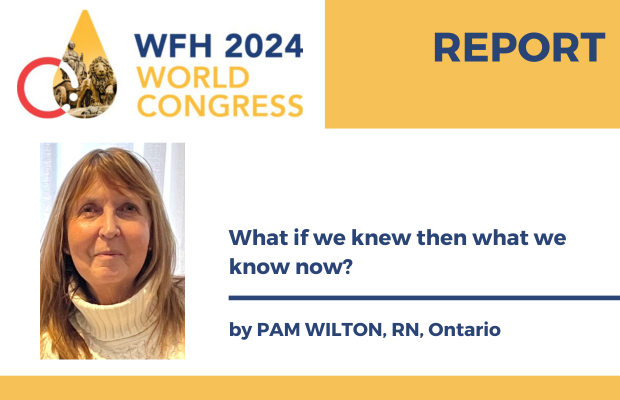What if we knew then what we know now?

The WFH 2024 World Congress was not your father’s conference!
For one reason or another, I have been fortunate to attend almost every WFH World Congress since my first in Dublin, Ireland, in 1996.
At each congress, I carefully plotted out my schedule so that I could attend the sessions where I expected to learn something new and important in caring for my son. I cannot begin to describe the knowledge, skill, and resources I gained each time. Eventually, my confidence grew so I thought I could share my experience and learning with other mothers in our global hemophilia community. I was humbled by the women I met and always came back to Canada feeling grateful.
However, as my knowledge grew, I realized that our hemophilia care was fragile and potential improvements in care and treatment would be costly in terms of dollars and human resources. I needed to advocate for my son and friends. I shifted my conference schedule somewhat to include sessions where I could learn how to do that effectively. The years went by. Canadian leaders advocated effectively for innovative treatments. My son’s life improved. He grew up, got a good education, found meaningful employment, volunteered, married a wonderful woman (much to his sister’s surprise) and gave me a granddaughter and grandson. You see where this is going?
My role and reason to be at the WFH 2024 World Congress in Madrid had shifted since 30 years ago. Firstly, I was asked to speak at the Women and girls with bleeding disorders workshop: heavy menstrual bleeding. Then I was asked to chair a session: How to go from caregiver, to patient, to advocate. My life was flashing before my eyes! As chair of the WFH Susan Skinner Memorial Fund, I had the pleasure of welcoming our scholars from around the globe. Each of the scholars is a woman who has already volunteered with her home WFH National Member Organization (NMO) and has shown serious interest in learning more about advocacy.
By now I trust you see that I was strongly focused on women with bleeding disorders. In fact, with a rare exception the sessions I attended were all focused on women. This was brand new for me. I knew well in advance that the WFH 2024 World Congress had a strong and genuine focus on women but was impressed and surprised when these sessions had standing room only. There was an equal number of men and women. I was selfishly giddy. Finally, the hemophilia world had noticed that women bleed too! I could learn about my own health. And that of my granddaughter’s.
By the second day of slides and speakers and data and bad coffee, I found myself feeling angry. I listened to experts share the findings of research related to women with bleeding disorders, including “symptomatic carriers” like me. I was reminded of studies related to cardiac disease, cancer and even bleeding disorders meant to inform care for women that included no women. When women from several countries told us they cannot participate in research without consent from their husband or father, I felt helpless knowing that we need more research and that we need more women to volunteer to participate in studies.
Physicians were talking about phenotypes, not factor levels. They spoke about comorbidities such as iron deficiency, pelvic floor issues, fertility problems, mental health consequences, poverty, bone health, pain and on and on.
Maybe it was jet lag or the pain in my knee or even the lack of coffee, but I suddenly felt really angry. This was not all news to me, but it was hitting hard, and I started thinking what if?
I resisted a strong urge to scream and instead leaned forward, during the break, to vent to a wonderful hematologist from the U.K. She listened carefully and did not judge me. She softly whispered, “I am so sorry.”
Her empathy was all it took to shake me out of my selfish pity party. Afterall, with my mother’s help and my own trials and errors, I managed to make it through my childhood, teen years and early adulthood. We managed on our own with no diagnosis or care. I cannot tell you the number of times a physician or nurse or dentist or surgeon blew off my symptoms. I went to nursing school and began the career I still nurture and love today. I married my high school sweetheart (much to my sister’s surprise) and together we have two great kids. Finally, after the birth of our son, I connected to the bleeding disorder treatment centre where I got the benefit of their knowledge, such as it was back then. Now we have two grandchildren. We have extraordinary friendships. Our life is good.
Still I wonder… what if?




